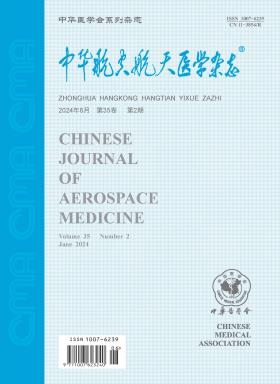Effects of 72 h-isolation and confinement with sleep deprivation on astronaut's attention on network functions and operation performance of manual controlled simulated rendezvous and docking task
引用次数: 0
Abstract
Objective To measure the effects of 72 h-isolation and confinement (IC) with or without sleep deprivation (SD) on attention network functions and operation performance of manual controlled rendezvous and docking task. Methods Twelve healthy male volunteers were randomly divided into 4 groups of 3. The experiments were done by means of self-control and cross-over design. Two groups underwent 72 h IC without SD, and then recovered for 7 d. After that, they underwent 72 h IC with SD. Other 2 groups underwent the identical environments in the opposite order. The evaluation of attention network functions and the functional nuclear magnetic resonance examination of brain were conducted before and after isolation. The operation performance of manual controlled rendezvous and docking task was tested during isolation. Meanwhile, the functional magnetic resonance imaging (fMRI) technology was used to evaluate the autonomic activity in the brain region. Results ①The volunteers, average reaction time, accuracy and omission rates of the attention network function test in 72 h IC had insignificant differences as compared with those before the isolation (P>0.05). The 72 h IC and SD caused average reaction time and omission rate evidently increased (t=2.505, 2.324, P 0.05). ②The fMRI data indicated that the spontaneous nervous activity in right frontal eye field was significantly weakened by IC and SD (t=6.580, P<0.05), but the activities in 3 clustering fields of right temporal lobe joint were significantly enhanced (t=6.726, 4.905, 8.305, P<0.05). ③As compared with those in IC condition, the volunteers, success rate of manual controlled rendezvous and docking task in IC plus SD condition was evidently decreased (χ2=9.761, P<0.01), but the fuel consumption, pitch angle deviation and yaw angle deviation were significantly increased (t=3.475, 3.161, 3.375, P<0.01) and the docking time was significant shortened (t=2.681, P<0.01). Conclusions 72 h IC and SD has negative effects on attention network function and operation performance of manual controlled rendezvous and docking task. Sleep deprivation would be the main factor. Key words: Sleep deprivation; Social isolation; Attention; Computer simulation; Aerospace medicine; Magnetic resonance imaging; Manual controlled rendezvous and docking72小时隔离禁闭伴睡眠剥夺对航天员注意力对人工控制模拟交会对接任务网络功能和操作性能的影响
目的观察72小时隔离禁闭(IC)伴或不伴睡眠剥夺(SD)对人工控制交会对接任务注意网络功能和操作性能的影响。方法12名健康男性志愿者随机分为4组,每组3人。实验采用自我控制和交叉设计的方法进行。两组大鼠分别进行72 h无SD灌胃,恢复7 d,之后进行72 h有SD灌胃。另外两组则以相反的顺序经历相同的环境。分离前后分别进行注意网络功能评价和脑功能核磁共振检查。在隔离状态下对手动控制交会对接任务的运行性能进行了测试。同时,应用功能磁共振成像(fMRI)技术评价脑区自主神经活动。结果①与隔离前比较,受试者在72 h内的注意网络功能测试的平均反应时间、正确率和遗漏率均无显著差异(P>0.05)。72 h IC和SD使平均反应时间和漏检率显著增加(t=2.505, 2.324, P 0.05)。②fMRI数据显示,IC和SD显著减弱了右侧额叶关节区自发神经活动(t=6.580, P<0.05),而右侧颞叶关节区3个聚类野区自发神经活动显著增强(t=6.726, 4.905, 8.305, P<0.05)。③与IC工况相比,IC + SD工况志愿者手动控制交会对接任务成功率明显降低(χ2=9.761, P<0.01),燃油消耗、俯仰角偏差和偏航角偏差显著增加(t=3.475, 3.161, 3.375, P<0.01),对接时间显著缩短(t=2.681, P<0.01)。结论72 h IC和SD对人工控制交会对接任务的注意网络功能和操作性能有负面影响。睡眠不足将是主要因素。关键词:睡眠剥夺;社会隔离;关注;计算机仿真;航空航天医学;磁共振成像;手动控制交会对接
本文章由计算机程序翻译,如有差异,请以英文原文为准。
求助全文
约1分钟内获得全文
求助全文
来源期刊

中华航空航天医学杂志
航空航天医学
自引率
0.00%
发文量
2962
期刊介绍:
The aim of Chinese Journal of Aerospace Medicine is to combine theory and practice, improve and popularize, actively advocate a hundred flowers bloom and a hundred schools of thought contend, advocate seeking truth from facts, promote the development of the related disciplines of aerospace medicine and human efficiency, and promote the exchange and penetration of aerospace medicine and human efficiency with other biomedical and engineering specialties.
Topics of interest for Chinese Journal of Aerospace Medicine include:
-The content of the journal belongs to the discipline of special medicine and military medicine, with the characteristics of multidisciplinary synthesis and cross-penetration, and mainly reflected in the aerospace industry, aerospace flight safety and efficiency, as well as the synthesis of special medicine, preventive medicine, environmental medicine, psychology, etc.
-Military aeromedicine (Air Force, Navy and Army aeromedicine) and civil aeromedicine, with a balance of aerospace medicine are the strengths of the journal.
-The change in aerospace medicine from a focus on promoting physiological compensatory adaptations to enhancing human performance under extreme environmental conditions is what the journal is helping to promote.
-The expansion of manuscripts in high altitude medicine is also a special emphasis of the journal.
 求助内容:
求助内容: 应助结果提醒方式:
应助结果提醒方式:


